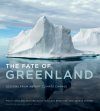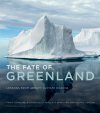By: Philip Conkling(Author), Richard B Alley(Author), Wallace S Broecker(Author), George Denton(Author), Gary Comer(Illustrator)
216 pages, 77 colour photos, 10 colour & b/w illustrations
![The Fate of Greenland The Fate of Greenland]()
Click to have a closer look
About this book
Customer reviews
Biography
Related titles
About this book
Viewed from above, Greenland offers an endless vista of whiteness interrupted only by scattered ponds of azure-colored melt water. Ninety percent of Greenland is covered by ice; its ice sheet, the largest outside Antarctica, stretches almost 1,000 miles from north to south and 600 miles from east to west. But this stark view of ice and snow is changing – and changing rapidly. Greenland's ice sheet is melting; the dazzling, photogenic display of icebergs breaking off Greenland's rapidly melting glaciers has become a tourist attraction.
The Fate of Greenland documents Greenland's warming with dramatic color photographs and investigates episodes in Greenland's climate history for clues about what happens when climate change is abrupt rather than gradual. Greenland's climate past and present could presage our climate future. Abrupt climate change would be cataclysmic: the melting of Greenland's ice shelf would cause sea levels to rise twenty-four feet worldwide; lower Manhattan would be underwater and Florida's coastline would recede to Orlando.
The planet appears to be in a period of acute climate instability, exacerbated by carbon dioxide we pour into the atmosphere. As The Fate of Greenland makes clear, it is in all of our interests to pay attention to Greenland.
Customer Reviews
Biography
Philip Conkling is Founder and President of the Island Institute in Maine. Richard Alley, a glaciologist, is Evan Pugh Professor of Geosciences and Associate of the Earth and Environmental Systems Institute at Penn State. Richard Alley, a glaciologist, is Evan Pugh Professor of Geosciences and Associate of the Earth and Environmental Systems Institute at Penn State.
Wallace Broecker (1931-2019), an oceanographer, was Newberry Professor of Geology at Columbia University and a winner of the Crafoord Prize in Geosciences.
George Denton, a geologist, is Professor of Geological Sciences and Quaternary Studies at the University of Maine.
By: Philip Conkling(Author), Richard B Alley(Author), Wallace S Broecker(Author), George Denton(Author), Gary Comer(Illustrator)
216 pages, 77 colour photos, 10 colour & b/w illustrations
"[...] the book gives a refreshingly clear picture of the science of studying climate change and of the curious, dedicated scientists in action."
– Publishers Weekly (starred review)
"This book teaches us a lot about how to do science and how to investigate difficult problems about the causes of environmental change. It shows that abrupt climate changes really have happened and puts forward likely mechanisms. It tells us a great deal about the wonders of Greenland and how important the country is as a window on to the recent glaciations. And it makes the whole idea of sudden, grave climate shocks arising from greenhouse emissions seem terribly plausible, even if it does not predict any particular shocks. It is not a story about lands' end, but it is a very fine tribute to [Gary] Comer."
– Times Higher Education
"[A] gripping rationale for their simple plea – 'Pay attention to Greenland.'"
– Bud Ward, The Yale Forum
"Scientists and non-scientists from all walks of life will find this an eloquent and timely read."
– Rick Docksai, The Futurist
"This is the best accounting of abrupt climate change availablebest because the science is on-target and nuanced and the storytelling is superb."
– Peter Kareiva, Chief Scientist and Vice President, The Nature Conservancy
"While abrupt changes in the Earth's climate system occur with some frequency, the drivers of these dramatic events are poorly understood. Nowhere are such occurrences more prominent than in Greenland, where several abrupt changes have occurred during the period since the arrival of Norse settlers in the 10th century. In this accessible, illuminating, and richly illustrated book, several prominent climate scientists focus on the case of Greenland to explore the causes and consequences of rapid climate change events."
– Oran R. Young, Bren School of Environmental Science and Management, University of California at Santa Barbara
"This book captures a unique view behind the scenes at a special time in climate science. It is an important work for several reasons: it connects past and potential future climate shifts that have large societal impacts to the mechanics of how the climate system works, and provides a glimpse of the personal detective work the authors have each engaged in as they and others have constructed our present understanding. It also captures well-informed views of how climate changes have worked in the recent past from the perspectives of scientists who have been at the forefront of unraveling aspects of this system. The Fate of Greenland is an excellent reference for establishing a working view of the planet on climate and glacial timescales. This is the right book, with the right tone, to bring this subject to a general audience."
– Mark Fahnestock, Institute for the Study of Earth, Oceans, and Space, University of New Hampshire






































